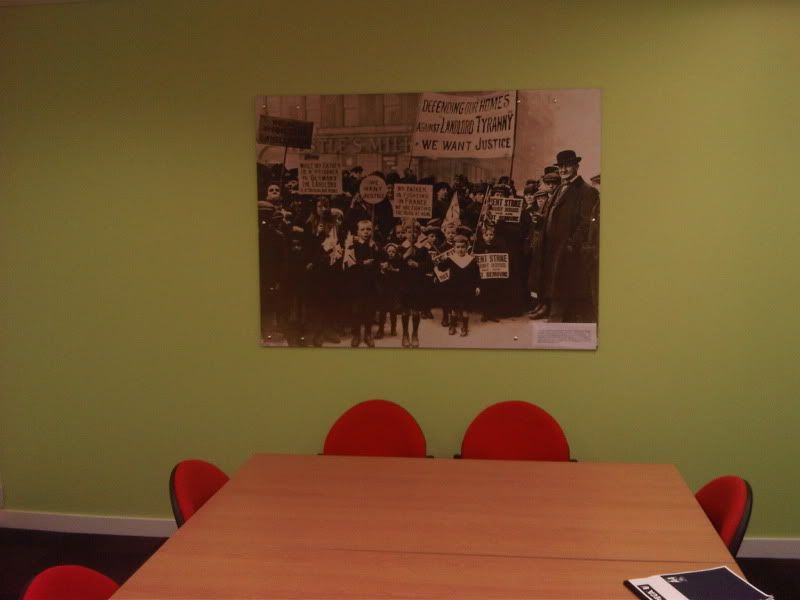Source 1: This photograph of a Glasgow rent strike demonstration is on display in the Labour Party meeting rooms at West Lothian Council Civic Centre.
 ">
">
Source 2: the John Maclean March sung by Dick Gaughan.
">
Lyrics to the song.
Hey, mac, did ye see him as he cam doun by Gorgie
Awa owre the Lammerlaw an north o the Tay?
Yon man is comin an the hail toun is turnin out
We're aa shair he'll win back tae Glesca the day
The jiners an hauders-on are merchin fae Clydebank
Come on nou an hear him he'll be owre thrang tae bide
Turn out Jock an Jimmie, leave yer cranes an yer muckle gantries
Great John Maclean's comin hame tae the Clyde
Argyll St and London Road's the route that we're merchin
The lauds frae the Broomielaw are here, tae a man!
Hey Neil, whaur's yer hauderums, ye big Heilan teuchtar
Get yer pipes, mate, an merch at the heid o the clan
Hullo, Pat Malone, shair A knew ye'd be here, so,
The red an the green, laud, we'll wear side by side
Gorbals is his the day an Glesca belangs tae him
Nou great John Maclean's comin hame tae the Clyde
Forward tae Glesca Green we'll merch in guid order
Will grips his banner weill, that boy isnae blate!
Aye, weill, man, thair's Johnnie nou, that's him thair the bonnie fechter
Lenin's his feir, laud, and Liebknecht's his mate
Tak tent whan he's speakin for thae'll mind whit he said here
In Glesca, our city, an the hail warl besides
Och man the scarlet's bonnie, here's tae ye Heilan Shonie
Great John Maclean's comin hame tae the Clyde
Aye weill, whan it's feenisht A'll awa back tae Springburn
Come hame tae yer tea, John, we'll sune hae ye fed
It's hard wark the speakin, och, A'm shair he'll be tired the nicht
A'll sleep on the flair, mac, an gie John the bed
The hail city's quiet nou, it kens that he's restin
At hame wi's Glesca freens, thair fame an thair pride
The red will be worn, ma lauds, an Scotlan will merch again
Nou great John Maclean has come hame tae the Clyde
The Myth of Red Clydeside?
This blog has mentioned other things connected with Scotland and WW1 which some historians think are "myths". There's the myth of the Scots as a "warrior race". Then there's the myth of Haig, the Butcher of the Somme. This blog page is about the myth of Red Clydeside. Or is it a myth? The Labour Councillors elected to West Lothian Council don't seem to think so. Nor did Hamish Henderson who wrote the "John Maclean March" or Dick Gaughan who sings the song.
You, of course, will have to judge for yourself.
What is meant by "Red Clydeside"?
This simply means the rent strikes and the trade union led strikes and other protests which took place on Clydeside during and soon after WW1. It also refers to the British government's attempts to control all this radical protest including the trial and imprisonment of leaders such as James Maxton, Willie Gallagher and John Maclean. Some believers in the "myth" go even further and suggest that Glasgow came close to revolution in the aftermath of the Great War.
The Key Events.
HyperlinkStudy the key events on this website page.
Source 3: From "The Flowers of the Forest" by Trevor Royle.
Clydeside remained quiet when English factories in London, the Midlands and the North went on strike in May 1917. The dilution commissioners brokered agreements in all the main factories, the Clyde Workers' Committeee went into decline and there was no repetition of the militancy which had made the government fear that they were dealing with a general revolt in 1915 - 1916.
After some initial difficulties Beardmore eventually gave Kirkwood a job as foreman at their Mile End shell factory where Gallagher was now a shop steward and between them these much feared revolutionaries quickly broke records for munitions production ... As TC Smout tartly notes in his study of that period, "this was no way to bring the capitalist system to its knees."